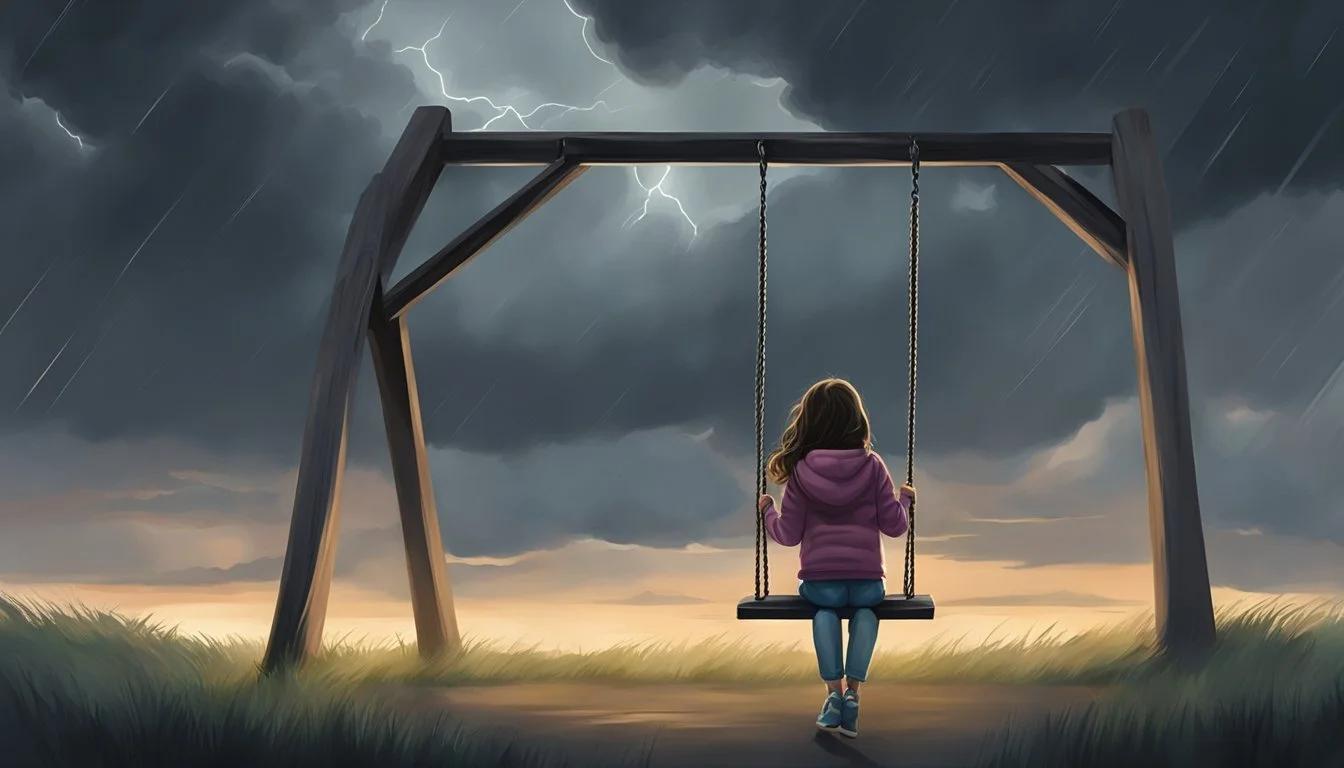Matilda's Melancholy: Mara Wilson's Battle with Depression and Anxiety
Child Star's Mental Health Journey
Mara Wilson, best known for her role as Matilda in the beloved 1996 film, faced personal struggles behind her cheerful on-screen persona. While captivating audiences with her charm and wit, Wilson grappled with mental health challenges that would shape her life beyond her Hollywood career.
At the age of 12, Wilson was diagnosed with OCD, depression, and generalized anxiety disorder. The pressures of fame and the demands of perfectionism took their toll on the young actress. Despite her outward success, Wilson's internal battles highlight the often unseen struggles faced by child stars in the entertainment industry.
Wilson's openness about her experiences has shed light on the importance of mental health awareness, particularly for young performers navigating the complexities of Hollywood. Her journey from child star to mental health advocate demonstrates the lasting impact of early fame and the resilience required to overcome personal challenges in the public eye.
Early Life and Rise to Fame
Mara Wilson's journey from a precocious child to a beloved young actress captivated audiences in the 1990s. Her natural talent and charm quickly propelled her into the spotlight, culminating in her iconic role as Matilda Wormwood.
Childhood Beginnings
Mara Elizabeth Wilson was born on July 24, 1987, in Burbank, California. She grew up in a family of five children, with three older brothers and a younger sister. Wilson's interest in acting emerged early, sparked by her brothers' involvement in commercials.
At age 5, she began auditioning for roles. Her natural charisma and ability to memorize lines impressed casting directors. Wilson's parents supported her budding career while ensuring she maintained a normal childhood.
Breakthrough Roles
Wilson's big break came in 1993 when she was cast as Robin Williams' youngest daughter in "Mrs. Doubtfire". Her performance charmed audiences and critics alike. This success led to more prominent roles.
In 1994, she starred in the remake of "Miracle on 34th Street". Wilson's portrayal of Susan Walker showcased her ability to carry emotional weight in her performances. These films established her as one of Hollywood's most promising child actors.
Becoming Matilda Wormwood
The role that defined Wilson's career came in 1996 with the adaptation of Roald Dahl's "Matilda". She embodied the precocious and telekinetic Matilda Wormwood with remarkable depth and authenticity.
Wilson's performance captured Matilda's intelligence, kindness, and determination. She worked closely with director Danny DeVito to bring the beloved character to life. The film became a cult classic, cementing Wilson's place in pop culture history.
Her portrayal resonated with children and adults alike, inspiring a generation of young readers. "Matilda" remains Wilson's most recognized and celebrated role, a testament to her talent as a child actor.
Struggles Behind the Spotlight
Mara Wilson faced significant mental health challenges while navigating childhood fame. Her experiences reveal the hidden difficulties of young stardom.
Early Encounters with Mental Illness
Mara Wilson was diagnosed with OCD, depression, and generalized anxiety disorder in seventh grade. As a self-described "perfectionist" and "worrier," she grappled with these conditions from a young age.
The pressures of fame exacerbated her struggles. Wilson found it difficult to seek help initially, facing barriers from guidance counselors and even her parents.
At age 12, Wilson entered therapy. This proved to be a turning point in addressing her mental health needs.
The Pressure of Hollywood Expectations
The entertainment industry placed immense pressure on young Mara Wilson. As she entered puberty, she faced harsh beauty standards and expectations.
Wilson developed body dysmorphia, struggling with her self-image. The transition from cute child star to adolescent actress proved challenging.
The industry's tendency to sexualize young actresses added another layer of discomfort. Wilson felt the weight of these expectations keenly.
Public Image and Private Reality
Mara Wilson's public persona often contrasted sharply with her private experiences. While she portrayed confident characters on screen, she battled insecurity off-camera.
Social media amplified this disconnect, creating additional pressure to maintain a certain image. Wilson grappled with imposter syndrome, feeling inadequate despite her success.
The loss of her mother during this time added to her emotional burden. This personal tragedy, combined with her mental health struggles, shaped her decision to step away from acting.
Transition to Writing and Advocacy
Mara Wilson's journey led her from child stardom to becoming a respected writer and mental health advocate. She found new ways to express herself and help others through her creative pursuits and public platform.
Embracing Authorship
Wilson discovered her passion for writing as an adult. She penned articles for various publications, sharing her experiences and insights. In 2016, she released her memoir "Where Am I Now?: True Stories of Girlhood and Accidental Fame."
The book delves into her life as a child actor and her struggles with mental health. It received critical acclaim for its honesty and wit. Wilson's writing style resonated with readers, particularly those who grew up watching her films.
She continued to write essays and opinion pieces for major outlets. Her work often focuses on the entertainment industry, mental health, and societal issues.
Addressing Mental Health
Wilson openly discusses her experiences with anxiety, depression, and OCD. She shares how these conditions affected her during her acting career and beyond. Her candid approach helps destigmatize mental health issues.
She participates in podcasts and interviews to raise awareness. Wilson emphasizes the importance of seeking help and proper treatment. She discusses her own journey with therapy and medication.
Her advocacy extends to social media, where she engages with followers about mental health topics. She encourages open dialogue and provides resources for those seeking support.
Advocating Self-Acceptance
Wilson promotes body positivity and self-acceptance in her work. She addresses the pressures faced by child stars and young people in general. Her writing often critiques unrealistic beauty standards in Hollywood and society.
She advocates for better treatment of child actors in the entertainment industry. Wilson shares her experiences to highlight the challenges young performers face. She calls for stronger protections and support systems for child stars.
Through her platform, she encourages others to embrace their authentic selves. Wilson's message resonates with many who struggle with self-image and societal expectations.
Continued Career in the Arts
Mara Wilson's artistic journey evolved beyond her childhood acting roles. She found new avenues to express her creativity and passion for storytelling.
Voice Acting Endeavors
Wilson transitioned into voice acting, lending her talents to animated series and podcasts. She voiced characters in popular shows like "BoJack Horseman" and "Big Hero 6: The Series." Her distinct voice brought depth to various characters, showcasing her versatility as a performer.
In the podcast realm, Wilson became a recurring guest voice on "Welcome to Night Vale," a surreal fiction series. Her contributions added to the show's unique atmosphere and storytelling style.
Appearances in Television
Though no longer a full-time actress, Wilson made select appearances on television. She played herself in an episode of "Broad City," offering a humorous nod to her childhood fame.
Wilson also participated in documentaries and interviews about child stardom and the entertainment industry. These appearances allowed her to share insights from her experiences and discuss the challenges faced by young actors.
Passion for Reading and Audiobooks
Books played a significant role in Wilson's life post-Hollywood. She became an avid reader and advocate for literature. This passion led her to narrate audiobooks, combining her love for storytelling with her voice acting skills.
Wilson narrated several audiobooks, including young adult novels and children's stories. Her experience as Matilda, a character known for her love of reading, made this transition feel natural and meaningful.
She also participated in public readings and literary events, further connecting with audiences through the written word.
Personal Life and Reflections
Mara Wilson's journey from child star to author has been marked by personal struggles and profound insights. Her experiences have shaped her perspective on fame, mental health, and resilience.
Beyond the Camera
After stepping away from acting, Wilson pursued education and writing. She attended New York University, graduating in 2009 with a degree in drama. Wilson's transition to adulthood was challenging, as she grappled with her past fame and future aspirations. She found solace in writing, penning articles for various publications and eventually authoring her memoir "Where Am I Now?: True Stories of Girlhood and Accidental Fame" in 2016. This book allowed Wilson to share her experiences and reflections on child stardom, family life, and personal growth.
Magic Powers of Resilience
Wilson's battle with mental health issues began at a young age. She was diagnosed with OCD, depression, and generalized anxiety disorder in seventh grade. Despite these challenges, Wilson developed coping mechanisms and sought professional help. Her resilience shines through in her advocacy for mental health awareness. Wilson often speaks openly about her experiences, using her platform to destigmatize mental illness and encourage others to seek help. She credits therapy, medication, and a strong support system for helping her manage her conditions.
Insights on Child Stardom
Drawing from her experiences as a child actor, Wilson offers unique perspectives on the entertainment industry. She has been vocal about the pressures faced by young performers and the potential long-term effects of early fame. Wilson's role in "Thomas and the Magic Railroad" marked her last major film appearance before stepping away from acting. She reflects on the challenges of transitioning from child star to adult, including the difficulty of being recognized primarily for childhood roles. Wilson advocates for better protections for child actors and emphasizes the importance of education and normalcy in their lives.




